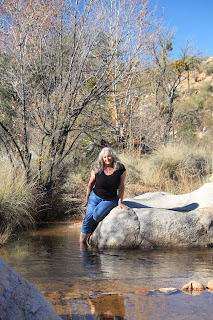If your photograph captures that reflection on the perfect day, it can seem as though it's as real as what was above. It's not, of course. It's always a reflection. My favorite ones look like an abstract painting with just enough air or water movement to blur the images.
The subject of reflection is a worthy one for a writer to consider and that will follow some recent photos of reflections taken at Catalina State Park.
Life itself is about reflecting and discerning the real from the illusion. Plato claimed everything we experience is a reflection or shadow and wrote a philosophical argument to defend his opinion.
Writing fiction is always about the reflection. It's what a writer looks for-- finding what is real and capturing a reflection in words. No matter how realistic the words might sound, they are always reflections of life. Some are closer to what might seem real and have the reader thinking they read a slice of real life but they are always reflections. That is their challenge and their beauty.
An example of how reflections play out in fiction will use the events in Benghazi when four men were killed by a terrorist assault, one of them our US ambassador.
Non-fiction will try to reveal exactly what happened-- a perfect reflection. Since it's done by humans, that is not possible; and in that case, even more so because not all events are totally known except by those there (some of whom died).
Fiction can decide to take what happened there, use the events but create fictional characters to set within it. Now the story still appears realistic, but it's a fuzzier reflection of what actually happened.
Finally you get into romance, sci fi, detective, apocalyptic etc. You take that event, the facts you know, but you use them somewhere else totally and in the case of a romance, you put a hero or heroine into the situation and before it's over make the ending work as you wish the real one had.
The thing is a lot of people consider 'serious' literature to be more accurately reflecting life. Perhaps... or perhaps it's a reflection of something totally away from the real object and suiting an author's agenda.
When writing or reading, it's all something to consider-- what reflection was that writer aiming to create and why.
Photo above cropped a bit and flipped to show that abstract painting in the water which the photo captured. I had thought of moving the log for the photo but opted to leave its interesting shape and contrasting color.
But because I could, I used my photo tools to take that log out, crop the image down a bit and remove some grasses with the wonders of Photoshop creating even more of a feel of an impressionistic painting-- this one in water. My version of Corel Photo-paint is an old one, but I know how to use it and it is a lot of fun to play with images to add or take away-- which also happens to be what creative writing is about.







